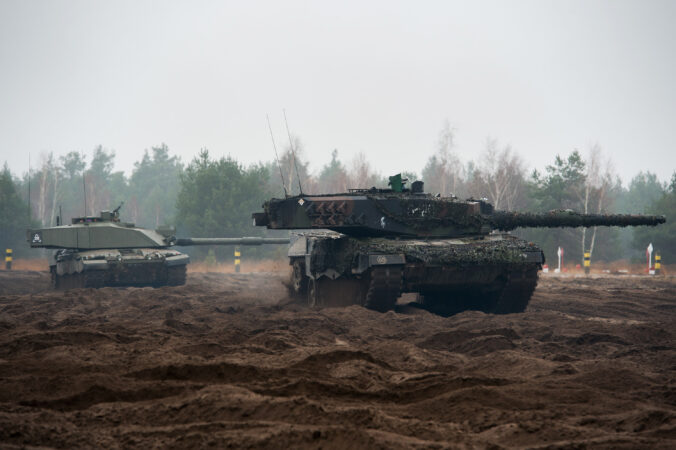Germany has finally given the go-ahead to transfer Leopard tanks to Ukraine, news that investors have been waiting with anticipation because of the consequences for the business of Rheinmetall, the manufacturer of these battle tanks.
According to Bloomberg, these are the 10 major shareholders in the group.
BlackRock, the world’s largest fund manager, holds a 5.24% stake in Rheinmetall, holding about 80,000 shares as of November 8, with a total value of €12.53 million.
There’s also Wellington Management, the Boston-based investment firm founded by Walter L. It owns a 5.08% stake in the German tank maker after buying nearly 793,000 shares in August. At market price, this share package was worth €133.3m at the time, although the share price has risen by 31% since then.
The Capital Group, a giant among investment firms, was founded by Jonathan Bell Lovelace in Los Angeles in 1931, and manages 2.7 Billions dollars in assets. It has offices spread all over the major countries of the world. In addition, in 2014 it became the second largest shareholder of Endesa, after the public offer to sell the electric company. She owns 5.05% of the shares of Rheinmetall. Its latest move was the acquisition of just over 888,000 shares in June, which, according to market prices, amounted to 195.8 million shares.
Vanguard, the investment fund giant, owns 3.53% of Rheinmetall’s capital, having acquired 340,000 securities on December 31 of last year, then worth 63 million. Joining the group is Fidelity Investments, an Abigail Johnson-led company that controls 3.09% of Rheinmetall, a conglomerate of shares with a market capitalization of $295 million.
Also of note is the participation of the EuroPacific Growth Fund, a fund marketed by Capital Group, which entered Rheinmetall on June 29, 2022, by purchasing 3.01% of the shares. Added to this is Dimensions Fund, an American investment firm based in Austin, Texas, founded in 1981 by David G. Booth, with offices in Europe and Asia. It was a pioneer in passive investing and currently manages over $500,000 million in assets. Its stake in Rheinmetall has reached 2.99% since August 2019, when it sold a block of shares whose market value at that time did not reach 800 thousand euros. Currently, its total share is 286 million.
Near the bottom of this list is Fidelity International, a subsidiary of Fidelity for Europe and Asia which has another 2.99% stake in Rheinmetall. The last change of ownership of the company was on January 2 of this year, when it sold 7,300 shares at that time, with a market value of 1.2 million. There is also M&G Investments, a London company listed on the London Stock Exchange since its split from Prudential, which controls 2.98% of Rheinmetall, which currently has a market value of 285 million. Its last operations with these securities date back to December 7, 2020, when it disposed of about 7,000 shares, valued at that time at 550 euros.
Finally, LSV Asset Management – a group founded in 1994 and headquartered in Chicago – managed $81 million in assets for 350 clients in September 2022. It owns 2.97% of Rheinmetall shares with a market capitalization of $284 million.
What is the value of the company in recent days?
The shipment of Leopard tanks to Ukraine has become the focus of recent political discussions at the European level in recent days, and in the midst of this controversy, investors have been eager to know what it might mean for their actions.
After confirmation of the green light from Germany to send tanks to Ukraine and expectations of increased demand in the short or medium term, the share price of the German manufacturer rose to 232 euros, a new daily record for the group. Already in the final stage of the Wednesday session, the titles closed at €220.90.
Despite this decline, Rheinmetall’s price is still well above levels seen at the beginning of the war in Ukraine, when the defense sector became one of the few bullish exceptions on the European stock market.
In the past 12 months, the company’s stock value has increased by 144%, with the largest increase occurring in February 2022, the month of the Ukrainian invasion by Russia. The investment frenzy in war materials allowed the company to rise to a stock market valuation of 9,566 million euros.
The expectation is that this trend will continue. Last Friday, UBS analysts revised the defense company’s recommendation to go up, changing it from “Neutral” to “Buy”, valuing the company at 233 euros per share. Two days earlier, on January 18, the German company received a higher valuation by Deutsche Bank analysts, which put it at €250 per share, a potential upside of 13% compared to the current share price.
What companies can benefit most from the end of the war in Ukraine?

“Wannabe internet buff. Future teen idol. Hardcore zombie guru. Gamer. Avid creator. Entrepreneur. Bacon ninja.”

